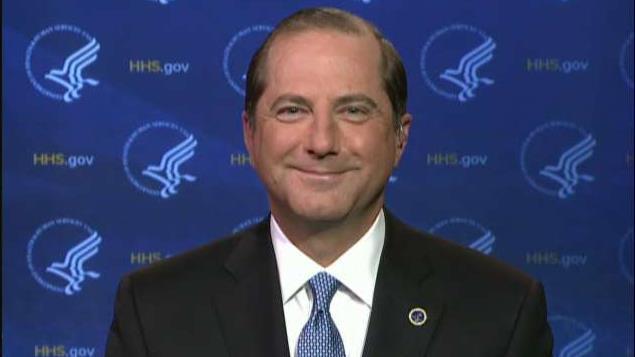Big Pharma takes Trump's proposal to disclose drug prices to federal court
President Trump’s attempts to force pharmaceutical companies to advertise their drug prices in television commercials has hit a roadblock, with Big Pharma taking the presidential directive to federal court.
The directive was announced back in May by Alex M. Azar II, the health and human services secretary, and would require pharmaceutical companies to disclose the cost of drugs if they are to exceed $35 per month.
While the concept of pricing transparency within the pharmaceutical industry appears to have noble intentions, the actual application may not serve much of a purpose, according to experts.
“Pharmaceutical pricing is incredibly complicated,” Clinical Professor of Marketing at Northwestern University Tim Calkins told FOX Business Network on Thursday. “In theory, it would pressure the pharmaceutical companies to reduce their drug prices, but the reality is much more complicated than that.”
| Ticker | Security | Last | Change | Change % |
|---|---|---|---|---|
| MRK | MERCK & CO. INC. | 117.65 | -4.28 | -3.51% |
| LLY | ELI LILLY & CO. | 1,044.67 | -13.51 | -1.28% |
| AMGN | AMGEN INC. | 375.82 | -8.50 | -2.21% |
“If you’re not careful, a rule like this will just cause more confusion than anything,” he added.
The ruling was supposed to take effect on July 9, but has yet to be enforced due to a group of drug manufacturing companies and trade group advertisers filing a lawsuit in federal court last month, asserting the proposal would confuse consumers and violate the companies’ First Amendment rights.
“You’re asking companies to release (drug) prices that consumers may never actually encounter,” Calkins said. “There are discounts, rebates, insurance coverage… So what price would these companies be forced to disclose?”
That lawsuit, filed in Washington, D.C., by Merck, Eli Lilly and Amgen, challenges the White House’s attempts to implement transparency when it comes to drug prices in advertisements.
“If the drug companies are embarrassed by their prices or afraid that the prices will scare patients away, they should lower them,” a spokeswoman for Health and Human Services said in a statement obtained by the Times. “President Trump and Secretary Azar are committed to providing patients the information they need to make their own informed health care decisions.”
While the matter works its way through the federal court system, pharmaceutical companies will not be forced to abide by Trump’s directive. However, should the courts side against Big Pharma, “the rule would be a big change for pharmaceutical companies,” Calkins said.
“If companies are really forced to embrace this (ruling), it could create issues for doctors and health care plans, as well,” he added. “All the players involved have vastly different interests.”
CLICK HERE TO READ MORE ON FOX BUSINESS
The case is MERCK & CO., INC. et al v. UNITED STATES DEPARTMENT OF HEALTH AND HUMAN SERVICES et al.




















